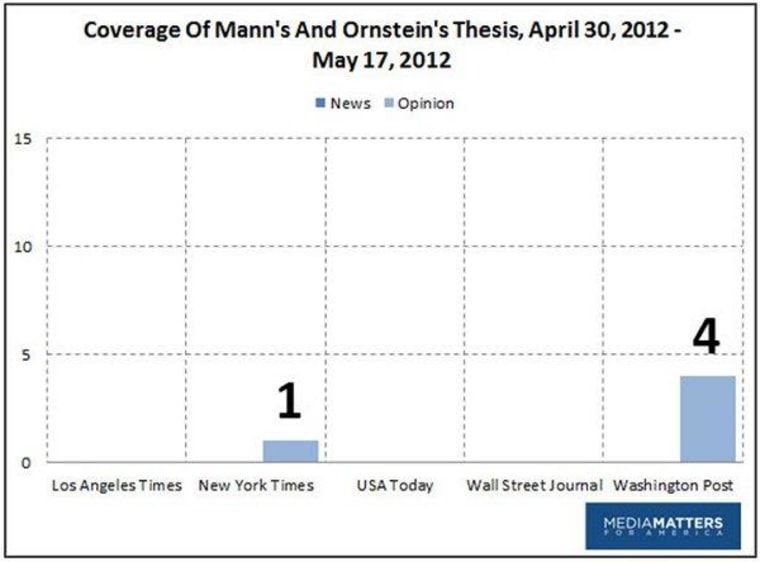Political scientists Tom Mann and Norm Ornstein -- celebrated and respected figures of the Washington establishment -- recently argued in an impressive op-ed, "Let's just say it: The Republicans are the problem." It seemed like the kind of piece that would spur some debate within the political establishment. That hasn't quite happened.
For Mann and Ornstein, blaming "both sides" for what ails Washington is no longer accurate, and only exacerbates the problems posed by the radicalization of today's Republican Party. "When one party moves this far from the mainstream," they argued, "it makes it nearly impossible for the political system to deal constructively with the country's challenges."
Mann and Ornstein added, "The GOP has become an insurgent outlier in American politics. It is ideologically extreme; scornful of compromise; unmoved by conventional understanding of facts, evidence and science; and dismissive of the legitimacy of its political opposition."
It's a rarely-seen thesis, which seemed likely to generate widespread discussion. But Media Matters prepared a fascinating report on the ways in which the Mann/Ornstein argument "has been largely ignored, with the top five national newspapers writing a total of zero news articles on their thesis." The report included this chart:
Remember, Mann and Ornstein aren't just two random political scientists with a provocative op-ed. Mann and Ornstein enjoy almost unparalleled credibility with the Beltway establishment, and are generally accepted as centrist observers, not ideologues or partisan bomb-throwers. For years, these two have been quoted constantly as objective experts.
This context matters. When Paul Krugman or Eugene Robinson says the radicalization of the Republican Party drives the dysfunction of our politics in the 21st century, they're correct, but the impact of perspective is limited. When Mann, a senior fellow at the Brookings Institution, and Ornstein, a resident scholar at the American Enterprise Institute, present the same argument, it carries added weight because of their reputation as non-partisan, apolitical observers.
Or at least, it's supposed to.
So, what's the problem? Why are Mann and Ornstein missing from the major Sunday shows? Where's the debate? There are competing explanations for this, though I continue to think much of this is the result of "rules" that dominate much of the establishment's discourse.
As we discussed a month ago, when it comes to the establishment discussing what ails the American system, the rules dictate that "both sides" are always to blame for everything in all instances. Even if reality clearly shows one party more responsible than the other, no one's allowed to say so -- to assign responsibility to those who deserve it is to be biased and irresponsible.
And these two violated the rules.
Worse, they chastised those who wrote the rules:
"Both sides do it" or "There is plenty of blame to go around" are the traditional refuges for an American news media intent on proving its lack of bias, while political scientists prefer generality and neutrality when discussing partisan polarization. Many self-styled bipartisan groups, in their search for common ground, propose solutions that move both sides to the center, a strategy that is simply untenable when one side is so far out of reach.
If the right or establishment types disagree, fine, but let's at least have the debate, rather than pretending the Mann/Ornstein thesis was unimportant and never published.
